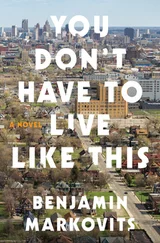He said he had worked, eaten, slept, and gone to the cinema. He shrugged. Nothing special.
“I get up early, make coffee, go to work. I lead a regular life. I’m content.”
Fabienne asked if he was married, had a family, or a girlfriend. He raised his hands, showed her his bare fingers. He said he had come here with a woman he had recently met, a trainee teacher at his school. But it wasn’t anything serious. She was far too young for him. In Paris he had a lover, Sylvie, who was married with three children. Fabienne said nothing. Perhaps she regretted her question. She looked out over the garden, and smiled again, as though she hadn’t heard what he had just said. Andreas said that was a nice thing about growing older, that you could take a more relaxed view of these things than when you were, say, twenty. Fabienne didn’t take up the subject, and began to talk about people in the village whom Andreas had once known. He had the feeling she was only talking to prevent a silence. She asked him if he remembered Manuel’s sister, Beatrice. “She’s divorced now. She has three children.”
“But she was so religious.”
“Not so much now,” said Fabienne.
Andreas said he had gone out with Beatrice for a while, but she was so repressed he had left her not much later.
Fabienne said Beatrice had declared one day that she no longer loved her husband. And she didn’t want to spend the rest of her life with someone who didn’t matter to her. Andreas said that was brave of her. He wouldn’t have thought her capable of such a step.
“Everyone thought there was some other man involved. But she lives alone. She seems to be doing fine.”
Her brother-in-law often came to talk to Fabienne, but she didn’t know what to tell him. No one really knew.
“I don’t believe in everlasting love,” said Andreas.
For a while Fabienne didn’t say anything. She seemed to be thinking. Then she said she and Manuel had been through a couple of rough patches too. Twenty years was a long time. But somehow they had always managed to get back together again. Andreas couldn’t imagine strife with Fabienne, raised voices, arguments. He couldn’t imagine her depressed, sad, or aggressive.
“For a while, I was doing very badly,” she said. “That was ten years ago. I moved out, and went back to my parents in France. Manuel was really sweet to me. He called every day and asked how I was doing, and said Dominik was missing me. I missed them too. After ten days I went back.”
“Why?”
Fabienne didn’t say anything. She looked at Andreas as though he ought to know, really. Then she got up and went into the garden again. Andreas followed her. The wind had dropped, and the sun was obscured by clouds. The lawn mower had stopped, and it was very quiet. The few sounds you could hear sounded very distinct, as if they were happening nearby, and in an enclosed room. Fabienne had kicked off her slippers, and was walking barefoot on the grass. Andreas saw that she was wearing ankle chains, which didn’t go with his idea of her. She turned off the lawn sprinkler and picked up a few garden tools that were left by the flowerbeds. Then she peered over to the edge of the forest, as though she was looking for something.
“Did you see the photos we have in the house?”
Andreas said he had noticed that they didn’t have any pictures, just family photos.
“Manuel is a keen amateur photographer,” said Fabienne. “He must have taken thousands of pictures. He photographs us all the time. Dominik. Dominik when he’s sick. Even when he’s asleep.”
He had a video camera now, she said. He filmed them all the time. Recently he had begun to copy all his video tapes onto DVDs. Tapes she had never seen before. An uncertain smile. She said sometimes Manuel struck her as very strange, even though she’d known him for such a long time. The uncertain smile again.
“I’ve never lived with a woman,” said Andreas. “I’ve no idea what that’s like.”
They went back inside the house. Fabienne put away the garden tools, and asked if Andreas wouldn’t have a piece of cake after all. He shook his head, and she seemed to be relieved. She carried the dirty glasses into the kitchen and rinsed them under the tap. Andreas was reminded of detective movies, where the criminals removed all trace of themselves, and ended up forgetting something, like a cigarette butt or a handkerchief.
The light in the hall was dim and yellowish, and the air felt so close that Andreas felt they were underwater. There was a long rumble of thunder outside, echoing away in the distance. Fabienne sat down on a step. Suddenly she looked very tired. Andreas remained standing in front of her, looking down at her. She asked what time it was.
“Half past four.”
“Manuel will be back soon.”
Andreas sat down beside her. For a moment they sat there in silence, then Fabienne began to speak softly. It was as though she was talking to herself. Her voice sounded mildly amused, as though she didn’t take herself seriously, what she was saying, or as if she was talking about somebody else. Sometimes she felt afraid, she said, she didn’t know what of.
“It began when Dominik was born. Everything went well. He was an easy child, and not ill very often. Perhaps if I had a reason to feel afraid, it wouldn’t be so bad.”
On the occasions when Dominik was stung in the mouth by a wasp, when Manuel had fallen down the basement steps and torn a couple of ligaments, she had been afraid too. But she had known what to do, she had provided first aid, she had driven Manuel to the doctor. The fear she really had in mind was much more diffuse, a feeling of strangeness, of not belonging. Manuel and Dominik sometimes appeared really strange to her. When they were down in the basement tinkering with something, or when they went out fishing together, she had these strange notions about what they were all doing. The life they were living, this house they had built, the photographs on the walls. Sometimes she imagined the house burning down, or some other disaster, and these imaginings had a somehow liberating effect on her. Andreas asked her if she ever talked about it with Manuel. She shook her head and stood up. “What would I say to him?”
Andreas said he had brought her something. He took the book out of his pocket, and passed it to her.
“What is it?”
“A little book. Do you know the author?”
“Never heard of him.”
“Read it,” said Andreas. “It might remind you of something.”
“How long are you staying in the village?”
“I’ll be here for a while. I’ll call you.”
The storm hadn’t begun yet. The clouds had pushed past, only in the east was the sky still dark, as though night had begun to fall. It was five o’clock when Andreas got back to the hotel. Delphine wasn’t there, and she hadn’t left him a message either. He called her on her mobile, but only got put through to her mailbox. He waited for her in the room. At seven she still wasn’t there. He turned on the TV. An early evening series was on, and Andreas tried for a time to follow it, but the characters all looked too alike, and he soon lost track of what was happening.
A little after half past seven Delphine walked in. Her hair was wet, and she was carrying a plastic bag under her arm. Andreas was furious. He asked her where she’d been, and why she hadn’t left a message. She said she hadn’t known when she’d be back. He could hardly expect her to sit in the room all afternoon.
“You could at least have left your cell phone switched on.”
“It doesn’t work abroad.”
Again Andreas asked her where she’d been. She said she’d gone for a walk. In a garden restaurant she had gotten into conversation with a group of young people. One of them was the night porter here at the hotel. She had asked him what there was to do here. He said there wasn’t anything.
Читать дальше












